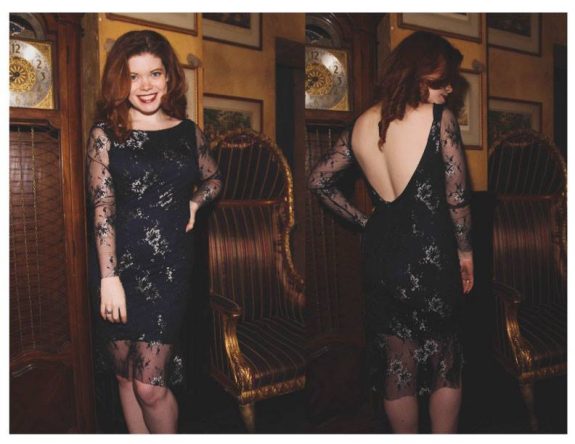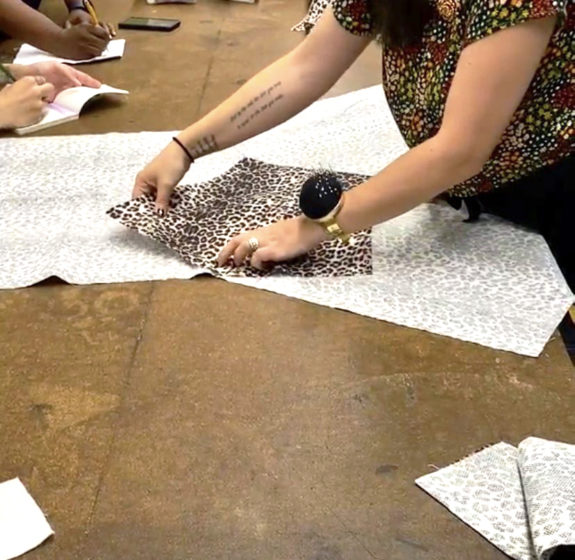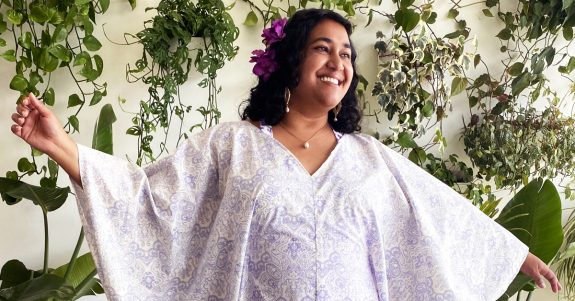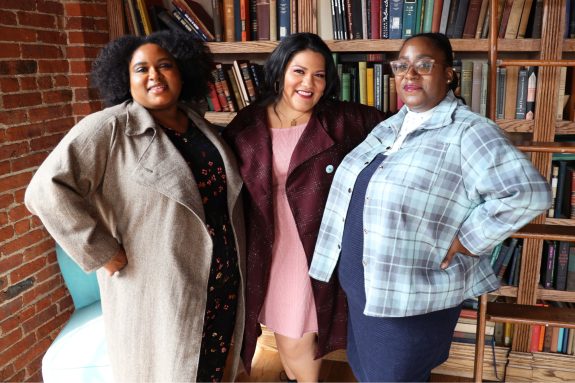Note from the designer: Welcome to our new series! One of the best (in my biased opinion) aspects of SmartGlamour is our models. I take a lot of pride in having ladies of all shapes, sizes, weights, heights, ethnicity, etc so that we are always showing a true depiction of reality. But what you don’t see is that these women typically end up being some of our biggest supporters. They believe in our message and I could not spread it without them. They all come from different backgrounds – and got involved with us in different ways – so here are there stories. They deserve to be told.
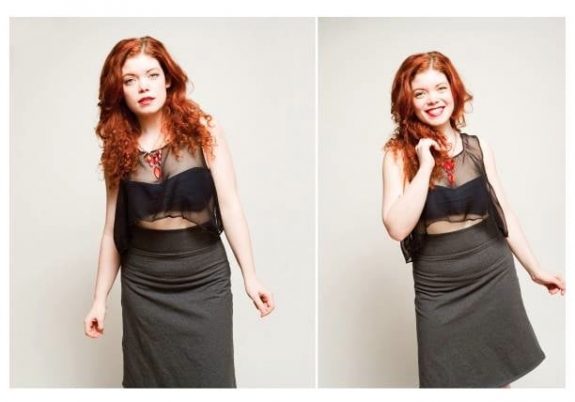
Megan Ribar – modeled in Spring 2014 look book, Winter/Holiday look book and presentation, Spring 2015 look book and runway show, and #AllBodiesAreGoodBodies campaign. Megan chose her favorite SG photos to feature.
1. Aside from occasionally modeling for SmartGlamour – what do you do?
Model, actually! But not for fashion – I’m an artist’s model for fine art photography, painting, and drawing. I have a night job working on staff at an awesome off-Broadway show to help pay the bills, and I’m also pretty crafty – right now, I’m making these cool beaded and wire-wrapped pendants out of semi-precious stones to sell on Etsy. I am also an avid reader of nerdy books, watcher of nerdy TV, and my background is in theater and dance.2. How did you get involved with the brand?
I responded to a casting call on a model networking site – I remember being very excited to see the notice, because I’d never seen the words ‘body positive’ and ‘fashion’ in the same sentence before – and it turns out that the shoot I was in SmartGlamour’s very first lookbook! I’ve since gotten to participate in two more look books, and to walk in two shows.3. You’ve modeled for us multiple times – what makes you continue to come back?
The message of acceptance and inclusion. The atmosphere of a SmartGlamour shoot or show is always such a fun one, too – it’s awesome to be surrounded by so many smart, animated, passionate, kind women who believe so strongly in supporting each other.
I also love getting the opportunity to model clothes! As a 5’5 lady with curves, I fall pretty well outside the typical standards for fashion modeling, which I’ve always kind of thought was bullshit.4. What does body positivity mean to you?
So, look. The relationship we each have with our bodies is one of the most important and challenging relationships we’ll ever have to cultivate, seeing as we’re stuck with the one body our whole lives- and if dealing with the basic messiness inherent to owning a human body isn’t enough to be getting on with, we also live in a culture that seems determined to poison that relationship from the get-go. We’re slammed with body shaming messages from the moment we’re old enough to interact with society at all.
The thing that happens when you teach people to be ashamed of their bodies is that you instill in them a deep belief that they’re never enough, and the feeling of not being enough is a desperate feeling. Some people respond to it exactly the way capitalism wants them to- they pour money into products, clothes, food, and gym memberships that they think will help them measure up. Some people respond to it by hiding from life in an effort to avoid what feels like inevitable scrutiny from a world that tries to tell them they aren’t good enough to exist. I have played both of those games, and let me tell you something: there’s no way to win either one of them. You’re setting yourself up to fail in both cases, because in both cases you are allowing someone else’s rules to determine your worth. And NO ONE else has the power to do that – you’re a human being, and as a human being, you’re inherently worthy. That’s just how that works.
So there’s a third way to respond: by choosing to claim ownership of our bodies and to practice radical acceptance. I say ‘practice’ because for most of us, it’s not a thing we can just get up one morning and decide to do. Like most worthwhile things in life, it’s a process that requires work. It requires constantly challenging the voices of judgment that you’ve been trained to listen to since childhood and instead letting your own voice and choices be stronger and louder. Sometimes this is way easier than others. Sometimes it’s almost impossible. But that’s what acceptance is about – acknowledging that even if you’re in a bad place and you’re struggling to find love for yourself, that’s still okay. That’s still valid. Your worth and value does not hinge on you being perfect all the time. You are valuable as is, and your body is valuable exactly as is, no matter what size you are, how you’re feeling about your gender that day, how tall you are, what color your skin happens to be, how fit (or not) you are, or what your body is able to do. You are always valuable. And since you are the only one who has to put up with all your body’s illness and injuries and traumas – you are also the only person who gets to decided how best to enjoy it. If that’s true for you, by the way, that’s also true for everyone around you, as well – one of the most effective ways to help shut down the voices of judgment is not to be one. That’s a key principle to the body positivity I practice – ‘not your body, not your business’. I’ll gladly help others celebrate themselves, but I won’t participate in tearing people down – and if I catch myself tempted, I do my best to stop. Because all judgment creates is shame, and shame is corrosive. It is not inspiring. It will never help anyone become sustainably healthier, because you cannot reasonably sustain hatred of yourself and expect that to end well. It’s just oppression. It is my belief that people learn, and grow, and become the best versions of themselves through love, compassion, encouragement, and acceptance. Not through shame.
One of the things that kills me about body shame is that it can paralyze. Body shame is how we end up unable to enjoy our food. It’s how we end up afraid to show up at the gym lest some imaginary meathead gives us the stank face for not looking perfect in our workout clothes. Body shame is how we stop ourselves from buying certain kinds of clothes because we ‘can’t get away with it’. It’s how we end up having sex with the lights off and hiding our perceived ‘body flaws’ with strategically draped sheets. It’s how we miss out on fun social opportunities because we don’t feel attractive enough to be seen in public. It, in essence, kills our ability to enjoy some of the best things in life.
It is my feeling that as human beings, we all have an untouchable right to love and enjoy our bodies, whatever they happen to look like. And that is, ultimately, what body positivity means to me – empowering people to own, love, accept, and enjoy themselves and to live the lives they actually want to be living, according to their own rules. I think that idea has the power to change lives. I think that it also has the power to make for a much healthier, more loving world.
5. If there is a message you could put across to other women through your modeling photos – what would that be?
That it’s okay to love, accept, and be proud of your body exactly as is!6. What is your advice to other women who would like to give modeling a try?
There will always be people telling you that you aren’t ‘x’ enough to model. Don’t listen to them. Aside from the fact that there are lots of different genres of modeling available to you outside of fashion, we are also living in a changing world where a lot of bold, awesome people are challenging the standards for what it means to be a fashion model – so you never know what opportunities will eventually present themselves to you. Go and make the work you want to make. You’ve only got one chance with this body of yours, so if you want to make it into art – I say do it. Just stay safe while you do – make friends with other models, and always check your references!

